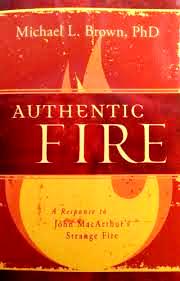Michael Brown’s Authentic Fire, reviewed by William De Arteaga
Michael L. Brown, Authentic Fire: A Response to John MacArthur’s Strange Fire (Excel Publishers, Dec 12, 2013), 418 pages.
Authentic Fire, by Dr. Michael L. Brown, is a masterful answer to the intemperate and angry attack on Charismatic movement and Pentecostalism by John MacArthur in his work, Strange Fire.[1] In the public launch to Strange Fire, MacArthur made clear his utter disdain for the Charismatic Movement in particular:
Nothing coming from the Charismatic movement has provided recovery or strengthening of the biblical Gospel. Nothing has preserved truth and sound doctrine. It has only produced distortion, confusion, and error. Yes, there are people in the movement who know and love the truth, have an orthodox Gospel, but are heterodox on the Holy Spirit. Not all of them are heretics. But I say again the contribution of truth from the people in the movement doesn’t come from the movement, but in spite of it …[2]
Brown is one of the best-qualified persons in Christendom to answer MacArthur’s accusations. He converted from nominal Judaism into Pentecostal Christianity, and then for a season became a cessationist. However, his careful study of the scriptures showed him that cessationism was indefensible. Subsequently, mission trips to Third World areas showed Brown time and again that today God works powerful “signs and wonders”—just as in New Testament times. Well educated, Michael Brown holds a Ph.D. in Near Eastern Languages and Literatures, his dissertation was on the healing character of God in the Old Testament. He has written multiple books on a whole range of issues, from biblical commentaries to works on revival, and Jewish oriented apologetics.
In his pastoral and teaching roles of the Brownsville Revival, and in his numerous teaching positions at various Pentecostal and Evangelical seminaries, Brown has demonstrated his commitment to the Pentecostal/charismatic appreciation of the gifts of the Spirit. But Brown has also been a critic of the excesses within the Charismatic movement, especially the exaggerated prosperity theology so present in Christian TV ministries. One of his many books, The End of the American Gospel Enterprise, took special aim at this issue.[3] In a recently released book he also criticizes, in his typical respectful but biblically forceful manner, the new “grace message” circulating in some charismatic churches. [4]
In fact, Brown may be considered among a special category of Christian theologian and critics—what I term, “prophetic critics.” That is, one who appreciates and affirms the moves of the Holy Spirit in revivals, but is critical of the improper “spillover” of revival, as when ministries and evangelists go beyond the bounds of scripture. In this august group one should first cite Jonathan Edwards, whose numerous writings both defended the First Great Awakening, but also critiqued its exaggerations.
Many past revivals have had such prophetic critics. For instance, Captain Kelso Carter was a leader of the first healing revival of modern Christianity, the Faith Cure Movement (1880s). However, he saw that many of its leaders were taking a wrong turn in advocating the rejection of medication as being contrary to healing prayer, and critiqued them for this.[5] In the charismatic movement of the 1970s, Charles Farah, Jr., one of the early leaders of that movement, wrote a now classic critical work on the exaggerations of the Word Faith Movement, From the Pinnacle of the Temple.[6] This work strongly criticized some of Kenneth Hagin’s teachings.
Category: Spirit, Winter 2014



